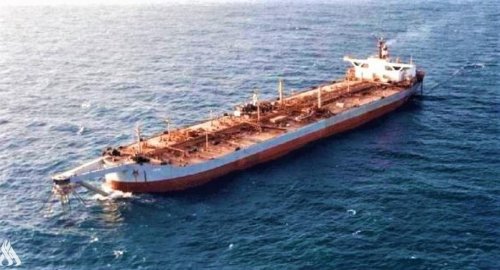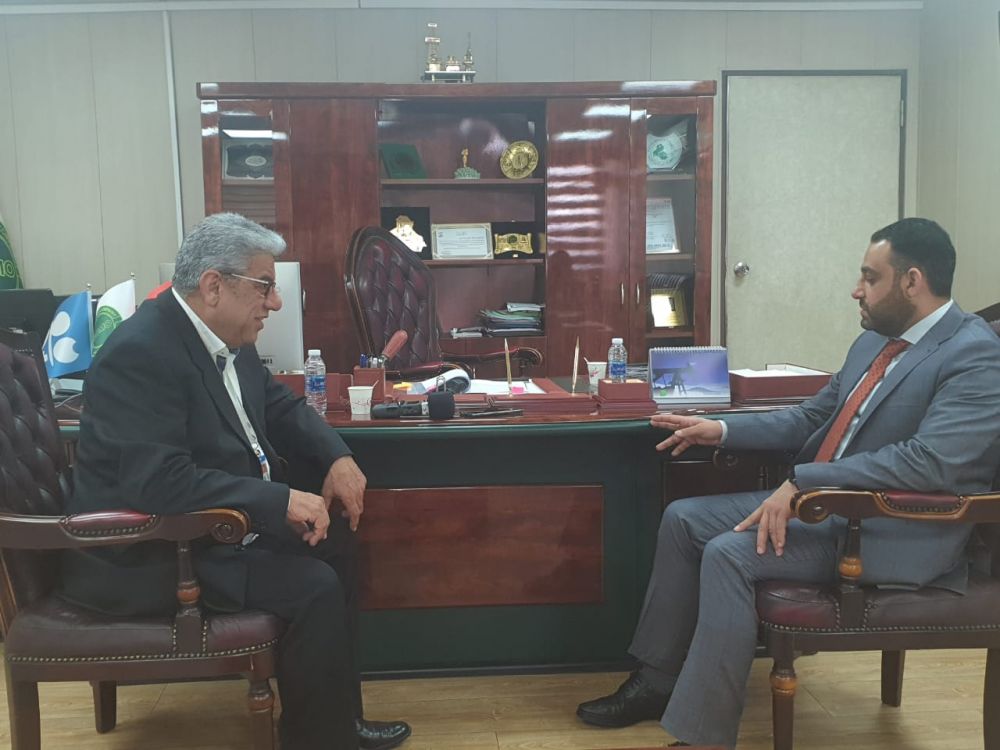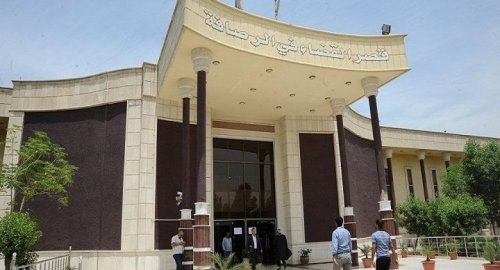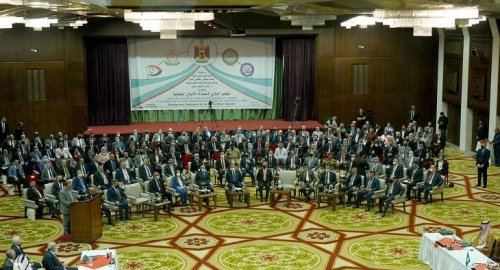
UN says enough money pledged to begin salvage work on decaying oil tanker in Yemen

- 22-09-2022, 08:58
INA- sources
The UN has received enough pledges of funding to begin the first phase of the salvage operation on the decaying Safer oil tanker, David Gressly, the organization’s resident and humanitarian coordinator in Yemen, announced on Wednesday.
The vessel, which contains more than 1.14 million barrels of oil, has been moored in the Red Sea off the coast of Yemen for more than seven years. It has had little or no maintenance during that time and its condition has deteriorated to a point where there are growing fears of a catastrophic oil spill.
The planned salvage operation to make it safe is split into two phases: The transfer of the oil from the tanker to another vessel, followed by a permanent storage solution until the political situation in Yemen allows for it to be sold or be transported elsewhere.
Speaking during a briefing on the sidelines of the 77th Session of the UN General Assembly, Gressly said 17 countries contributed to raising the $75 million needed for the first phase of the operation, including $10 million from Saudi Arabia, in addition to contributions from private sector, public foundations and a crowdfunding campaign organized by the UN. A second donation of $7 million by the Netherlands ensured the target was reached.
Donors need to follow through on their pledges by delivering the cash but Gressly told Arab News he is hopeful that the money will be in hand by the end of this month “because it’s already happening.”
He added that he senses a “high degree of will,” that he does not normally see, to tackle this problem because the cost of failure is so high. If the oil spills into the Red Sea the clean-up operation could cost about $30 billion. Such an environmental disaster would not only affect Yemen but also neighboring countries, including Djibouti, Eritrea, Somalia and Saudi Arabia. In addition fisheries would be damaged and shipping disrupted.
“While most of the money has not yet come in, most of the agreements have now been signed, which are the prerequisite for the actual funds to be transferred,” Gressly told Arab News.
“So I’m pretty confident that by the end of this month, September, there will be more than enough resources to do the initial round of contracts required to go forward. We have very hard commitments from those who have yet to sign contracts to do so.”
Tim Lenderking, the US Special Envoy for Yemen, said during the briefing that this positive development is the result of a combined effort by many countries, including those in the immediate vicinity of the tanker, the private sector and ordinary citizens who responded to a GoFundMe campaign organized by the UN. It came within “the context of the truce in Yemen,” he added.
“The Yemeni conflict has enjoyed progress; a lot of hard work between the UN, US, the Saudi-led coalition, the Yemeni government, (and) the Houthis agreeing to the truce and largely abiding by it,” said Lenderking.
Reflecting on the benefits of the existing truce for the people of Yemen — civilian casualties have fallen by 60 percent, four times more fuel is now entering Yemeni ports, and more than 21,000 people who had been “pinned in the country” since 2016 have been able to travel internationally from Sanaa airport following the resumption of commercial flights — Lenderking told Arab News that he believes the door is open for a “durable ceasefire” to be agreed in the months ahead.
He described the Houthi cooperation that helped achieve the truce on April 2, then extend it in June and again in August, as “a very positive step.”
The latest extension expires in 10 days and Lenderking said all parties with an interest in peace in Yemen are looking at the way forward with the aim of reaching a permanent political solution.
“We see strong signals from the Kingdom of Saudi Arabia, from the UAE, from the Sultanate of Oman,” he said. “And again, within the (five permanent members of the UN Security Council) there is a convergence of views that there is no military solution to the Yemen conflict, that there must be a process of reaching a political agreement.
“I can say that the international community is really united around seeing that the truce is expanded, and that those benefits that are accruing to the Yemenis from the truce are developed further.”
Lenderking said the US “would like to see more oil enter the market through Hodeidah port and used to power food mills, hospitals, schools and the transportation network.”
He said even the Iranian authorities, who back the Houthis, welcomed the truce “both in April and again in June.” But he added that “we need Iranian behavior to match these positive reactions to the truce,” as he called on the regime in Tehran to stop arming and training the Houthis.
The Houthis control Yemen’s western Red Sea ports, including Ras Issa, where the Safer is moored. The UN had been negotiating with the rebel group for years to gain permission for experts to examine the tanker. Both sides signed a memorandum of understanding in March, authorizing a four-month emergency operation to eliminate the immediate threat by transferring the oil on the tanker to another vessel.
“We are very keen to see an end to this potential disaster,” Yemeni Foreign Minister Ahmed Awad bin Mubarak told Arab News on Wednesday at an event hosted by the Consulate General of the Netherlands in New York.
“We are supporting all the initiatives by the UN … Yemen cannot afford such a disaster. It would cost Yemen directly more than $21 billion. It would damage not just the Red Sea but the effects would be harmful to the planet.”
In the longer term, the memorandum of understanding calls for replacing the Safer within 18 months with a vessel capable of safely holding a similar quantity of oil.
“We rely on the UN and the international community to make sure this plan will be implemented and to avoid any interruption that will delay the process,” Hannah Omar, from the King Salman Humanitarian Aid and Relief Center, told Arab News.
“For us it is really important to end this catastrophe and ensure that the Red Sea is safer after this implementation.”
The Safer’s structure, equipment and operating systems have deteriorated over the years, leaving it at risk of springing a leak, exploding or catching fire. The UN has warned for years that an oil spill from it could be four times larger than the Exxon Valdez disaster off the coast of Alaska in 1989, which is still considered the world’s worst oil spill in terms of environmental damage.
Experts estimate a major leak could severely damage Red Sea ecosystems upon which about 30 million people depend, including 1.6 million Yemenis, according to the UN.
The emergency has been ongoing for five years, yet it was only in the spring of this year that funding pledges began to come through.
The total pledge of $14 million from the Netherlands was a significant contribution toward hitting the target for the first phase.
Marc Gerristen, director for the Middle East and North Africa at the country’s Ministry of Foreign Affairs told Arab News that delay in reaching the funding target was largely due to the fact that it took time to convince people of the need to contribute.
“It’s very complicated, of course, to raise awareness if the scope of the problem is not yet completely clear,” he said, adding that the first challenge, therefore, was to make sure everyone understood the scale and severity of the situation.
“The UN played a very important role in this,” he said. “So this is something that was a collective effort, led by the UN. But when it came to mobilizing resources, getting others on board to pledge, this started about one or two years ago.
“This is when the UN looked for a lead country and this is where we (the Netherlands) took off the gloves, so to speak, and gladly played that role.”
source: ARAB NEWS
China: Government data shows signs of economic improvement
- International
- 08:42
Lebanese President Directs Army to retaliate to Border Fire
- International
- 08:34
Oil prices inch up despite tariff concerns, slowdown fears
- Economy
- 25/03/11
Klopp Tops List of Candidates to Coach Juventus
- Sport
- 25/03/12












